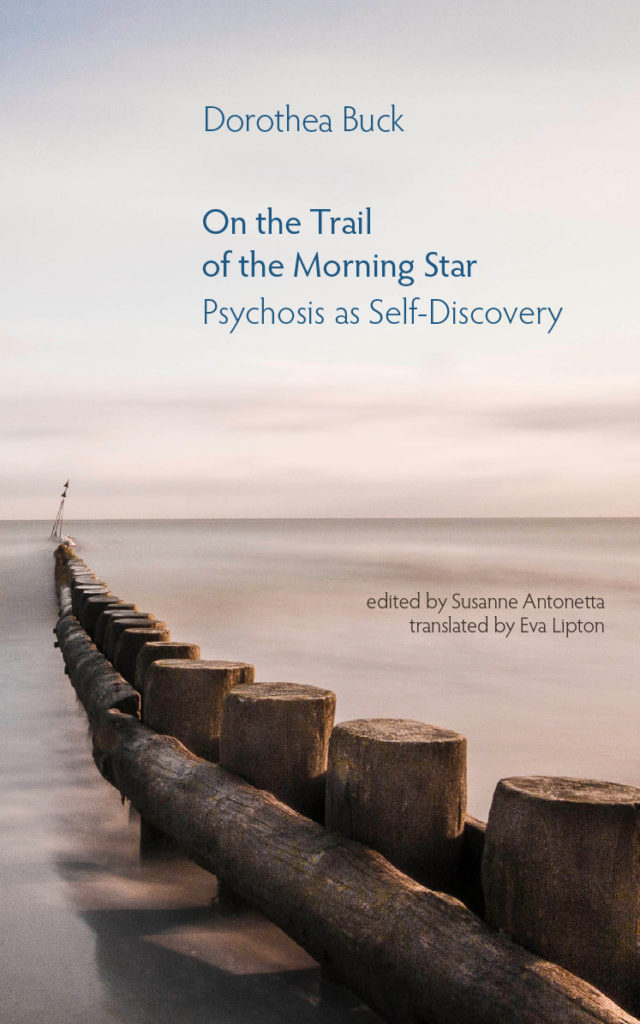In 1936, at age nineteen, Dorothea Buck followed the trail of a star along the mudflats of her North Sea home, Wangerooge Island in Germany. Hospitalized at a Christian institution called Bethel, she was sterilized under Nazi law upon a diagnosis of schizophrenia. Buck lost her lifelong dream of becoming a teacher—the sterilized could not get a college degree. Instead, she became an artist and activist. Buck, who lived to the age of 102, fought throughout her life for psychiatric reform. She created her own form of psychiatric treatment, which she called “trialogue,” in which psychosis experiencers, family, and clinicians join together to examine the experience of psychosis. Trialogue seminars still take place today.
Buck also demanded recognition of the Nazi murders of the disabled and the mentally ill. Many of these victims were psychiatric patients gassed in chambers built into six of Germany’s asylums. In 2008, Buck told an audience commemorating these murders that there must be “no second-class victims” of Nazi rule.
Psychiatry rooted in biology, Buck believed, would always reduce a condition like hers to something “genetically caused, meaningless, and incurable.” Like fellow German Paul Schreber’s Memoirs of My Nervous Illness, Buck’s On the Trail of the Morning Star calls for a radical rethinking of what it means to live with and in psychosis. This publication is the first time one of Buck’s major writings has appeared in English.
About the Contributors
Dorothea Buck (1917–2019) was a German sculpturer and advocate for the rights of people with disabilities. Buck’s own experiences with mental illness, including a diagnosis of schizophrenia, gave her a unique perspective and insight into the struggles faced by those with mental health conditions. She taught art and handicraft at the Technical College for Social Pedagogy in Hamburg from 1969–1982. Since 1970, she was active in the self-help movement, co-founding in 1992 the German Bundesverband Psychiatrie-Erfahrener (BPE; Federal Association of [ex-]Users and Survivors of Psychiatry), becoming Honorary Chair until her death. In 1989, she co-founded the “Psychosis-seminars.” She has given countless lectures in Germany and abroad and contributions in specialised journals and anthologies. Her writings include her acclaimed memoir On the Trail of the Morning Star: Psychosis as Self-Discovery as well as numerous essays and articles.
Susanne Antonetta writes and speaks about neuro-difference, science, and the environment for academic and general audiences. She was recently a subject of a Canadian Broadcasting Corporation’s Ideas radio documentary, “The Myth of Normal.” Her newest book is The Terrible Unlikelihood of Our Being Here. Forthcoming with Counterpoint is is The Devil’s Castle. She is also the author of Entangled Objects: A Novel in Quantum Parts (Slant Books, 2020), Make Me a Mother: A Memoir (W.W. Norton, 2014), Curious Atoms: A History with Physics (Essay Press, 2016), Body Toxic: An Environmental Memoir (Counterpoint, 2001), A Mind Apart: Travels in a Neurodiverse World (Penguin, 2005), and four books of poetry. Awards for her writing include a New York Times Notable Book nod, an American Book Award, a Library Journal Best Science Book of the Year, an Oprah Bookshelf listing, and others. Her essays and poems have appeared in The New York Times, Ms., The Huffington Post, The UK Independent, The Hill, Orion, and The New Republic, and have been featured on CNN. She lives in Bellingham, Washington.
German-American writer and translator Eva Lipton has worked in the arts in Germany and the United States most of her life. She has translated everything from Wagner’s libretto of Das Liebesverbot (The Prohibition of Love), to more than one hundred Lufthansa Classical Selections moderations, as well as liner notes for contemporary music productions and more. Lipton’s translation of Nancy Naomi Carlson’s villanelle “Bystander” into German was released as part of New Voices: Contemporary Writers Confronting the Holocaust (Vallentine Mitchell, 2023). Lipton currently lives in New Mexico.





One thought on “On the Trail of the Morning Star: Psychosis as Self-Discovery”
Comments are closed.